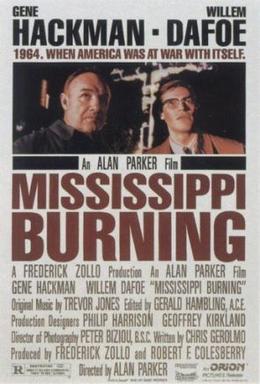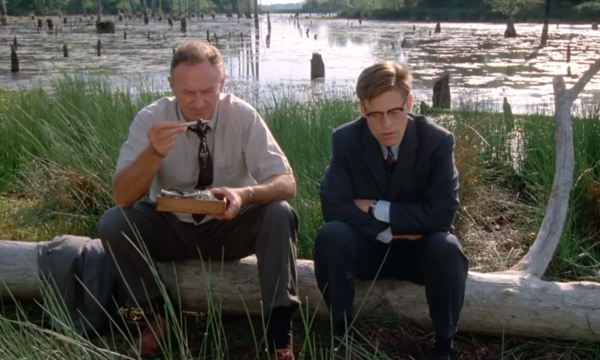← Back to Reviews
in
Mississippi Burning
Alan Parker has built an impressive resume as a director that defies rhyme and reason in terms of the type of movies he likes to make. I've seen a healthy chunk of his work and there's no doubt in my mind that his masterpiece has to be 1988 Best Picture nominee Mississippi Burning, an angry and disturbing docudrama that brings three dimensional characters to an ugly true story that will manipulate viewer emotions to maximum effect.

In 1964, three civil rights activists were murdered in Mississippi and disappeared and this film documents what happened when two very different FBI agents are sent down south to find out exactly what happened. Agent Ward (Willem Dafoe) is a buttoned-up, by-the-book, strictly by procedure kind of agent while Agent Anderson (Gene Hackman) is a little more folksy and thinks the way to find the answers they're looking for is by cozying up to the people, even though they have already formed a code of silence and have no attention of cooperating with the FBI. Agent Anderson further complicates the investigation by getting a little to close to a deputy's wife (Frances McDormand).

Parker has mounted an emotionally charged scale on a large canvas that still maintains a sense of intimacy, with grand assistance from Chris Gerolmo's unapologetic screenplay which puts bigotry front and center and often shocks the viewer with the kind of behavior this kind of hate can manifest. My jaw dropped when the agents were sitting in their motel room and it was suddenly riddled with gunfire. It's frightening that these people were not the least bit concerned about the possible consequences of murdering a federal agent. On the other hand, I loved when Agent Ward is informed that the motel owner wants them out because it's bad for business and Ward tells his assistant to buy the hotel.

There were a couple of minor storyline moves that I found troublesome, troublesome to the point that we're not sure if they really happened or if they were added for dramatic effect. The relationship between Anderson and the deputy's wife was particularly troubling. Anderson had to know that what he was doing was compromising the investigation and had to know that it wouldn't bode well for this woman, but it made for some compelling drama.

In addition to Best Picture, this powerhouse docudrama received six other nominations. Gene Hackman's alternately folksy and no-nonsense Anderson earned him a Lead Actor nomination and McDormand's genteel deputy's wife earned her a supporting actress nomination, as did Parker for Best Director. Film editing and sound also received nominations and Peter Biziou's cinematography won the Oscar that year.

Performance wise, can't wrap without mentioning Willem Dafoe's crisp and controlled performance as Agent Ward, Brad Dourif's smart-assed deputy, Stephen Tobolowsky's icy Klan leader, Gailard Sartain's nasty sheriff, and R, Lee Ermey's mayor. A shattering and thought provoking cinematic experience that provides some closure, but not enough, never enough.
Alan Parker has built an impressive resume as a director that defies rhyme and reason in terms of the type of movies he likes to make. I've seen a healthy chunk of his work and there's no doubt in my mind that his masterpiece has to be 1988 Best Picture nominee Mississippi Burning, an angry and disturbing docudrama that brings three dimensional characters to an ugly true story that will manipulate viewer emotions to maximum effect.

In 1964, three civil rights activists were murdered in Mississippi and disappeared and this film documents what happened when two very different FBI agents are sent down south to find out exactly what happened. Agent Ward (Willem Dafoe) is a buttoned-up, by-the-book, strictly by procedure kind of agent while Agent Anderson (Gene Hackman) is a little more folksy and thinks the way to find the answers they're looking for is by cozying up to the people, even though they have already formed a code of silence and have no attention of cooperating with the FBI. Agent Anderson further complicates the investigation by getting a little to close to a deputy's wife (Frances McDormand).

Parker has mounted an emotionally charged scale on a large canvas that still maintains a sense of intimacy, with grand assistance from Chris Gerolmo's unapologetic screenplay which puts bigotry front and center and often shocks the viewer with the kind of behavior this kind of hate can manifest. My jaw dropped when the agents were sitting in their motel room and it was suddenly riddled with gunfire. It's frightening that these people were not the least bit concerned about the possible consequences of murdering a federal agent. On the other hand, I loved when Agent Ward is informed that the motel owner wants them out because it's bad for business and Ward tells his assistant to buy the hotel.

There were a couple of minor storyline moves that I found troublesome, troublesome to the point that we're not sure if they really happened or if they were added for dramatic effect. The relationship between Anderson and the deputy's wife was particularly troubling. Anderson had to know that what he was doing was compromising the investigation and had to know that it wouldn't bode well for this woman, but it made for some compelling drama.

In addition to Best Picture, this powerhouse docudrama received six other nominations. Gene Hackman's alternately folksy and no-nonsense Anderson earned him a Lead Actor nomination and McDormand's genteel deputy's wife earned her a supporting actress nomination, as did Parker for Best Director. Film editing and sound also received nominations and Peter Biziou's cinematography won the Oscar that year.

Performance wise, can't wrap without mentioning Willem Dafoe's crisp and controlled performance as Agent Ward, Brad Dourif's smart-assed deputy, Stephen Tobolowsky's icy Klan leader, Gailard Sartain's nasty sheriff, and R, Lee Ermey's mayor. A shattering and thought provoking cinematic experience that provides some closure, but not enough, never enough.
